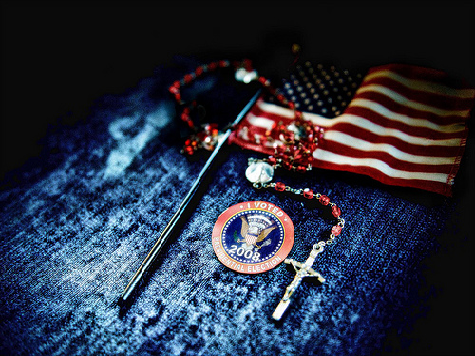After being denied a campaign “rally” at Regis University in Denver, the Obama campaign settled for a “dialogue” with a co-chair of a group that calls itself “Catholics for Obama.”
According to Catholic News Agency, about 45 people attended the dialogue on October 25th, the topic of which was “Catholic Social Teaching: The Intersection of Faith and Politics.”
Paul Alexander, director of Regis University’s Institute for the Common Good, said that the Obama campaign had originally wanted an event at the Jesuit university that had “more of a rally element.”
“We just felt we couldn’t do a rally, but we felt a healthy dialogue among Catholics was important,” said Alexander.
Nicholas P. Cafardi, Catholics for Obama national co-chair and a law professor and dean emeritus of Duquesne University School of Law, helped develop the dialogue, along with another co-chair of the group, Victoria Kovari, and Broderick Johnson, a senior adviser to the Obama campaign.
According to Alexander, the purpose of the dialogue was to “bring a message that is totally non-political.”
Defending the Obama administration’s HHS mandate, Cafardi said the Church’s position on abortion “ignores the need to use prudential judgment to decide the best way to protect human life.” Cafardi asserted that the administration’s “conscience accommodation,” which has been rejected by both the Church and individual business owners opposed to the mandate, is adequate.
Cafardi, who rejects the Catholic Church’s position on abortion, criticized the Catholic bishops’ actions on political issues, particularly their emphasis on religious liberty. “Our sacred pastors will tell us the ethical and moral principles that should govern human behavior. They can tell us the values that should be defended,” he said. “No bishop, no priest, can tell you how to vote, ever. They don’t have that right.”
However, in contrast, Pope Benedict XVI, in his 2011 World Day of Peace message, called religious freedom the “path to peace.” The Pope said that since “religious freedom is at the origin of moral freedom,” it should be understood “not merely as immunity from coercion, but even more fundamentally as an ability to order one’s own choices in accordance with truth…”
The Pope continued:
When religious freedom is acknowledged, the dignity of the human person is respected at its root, and the ethos and institutions of peoples are strengthened. On the other hand, whenever religious freedom is denied, and attempts are made to hinder people from professing their religion or faith and living accordingly, human dignity is offended, with a resulting threat to justice and peace….”

COMMENTS
Please let us know if you're having issues with commenting.